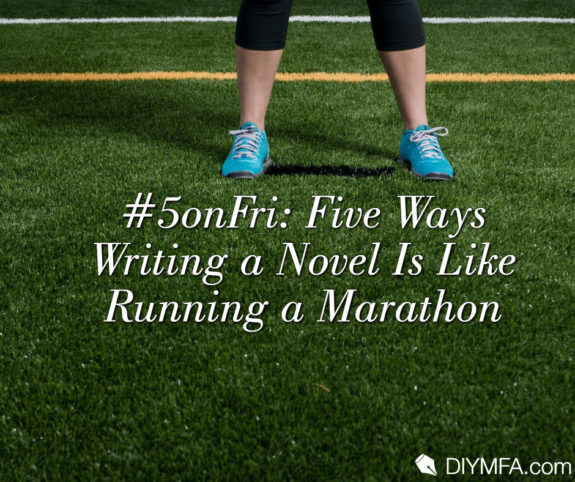Writing a novel is a marathon, not a sprint.
They’re both ambitious undertakings that require consistent, focused effort over a longer period of time. They both require a special kind of dedication and optimism. And neither once comes without its setbacks. But that’s why we take on these challenges: to prove ourselves. To accomplish something. Oh, and to maybe achieve fame and fortune if we’re good.
If you want to be one of the rare few that writes a novel, you can learn a lot from the process of running a marathon to improve your writing.
1. It’s more of a mental challenge than you think
Obviously, writing a novel is a cerebral pursuit, much more so than running. But both activities challenge you mentally, especially if you have to find a way to keep going when all reason tells you to stop. In fact, the hardest part of running a marathon, in my experience, was convincing myself the entire time not to stop just because it was hard.
The very same internal struggle happens for many writers. Maybe you worry that everything you write is trash. Maybe your brain tries to convince you to go do something easier. But you must develop the mental strength to overcome those self-defeating thoughts. You must get started anyway. A common piece of running advice is to just commit to ten minutes. At that point, you’re warmed up, and you’re more likely to keep going. The same holds true for writing. Even if you don’t feel like starting, just sit down to type for ten minutes. You’ll likely find your groove and move past the negative thoughts.
2. Planning and preparation will increase your chances of success
Just like there are pantsers who sit down and write a whole novel “by the seat of their pants,” there are also a handful of people who do a marathon with very little training. In the case of the former, many let their messy, pantsed drafts sit for years because they’re too difficult to fix. As for the latter—you can’t walk for two weeks after the race.
Of course, there are outliers in both cases, but you’re likely to get a better outcome in writing and running if you prepare. Learning how to write a novel, coupled with researching your subject, developing your characters and world, and creating an outline will make writing your first draft a smoother process. Similarly, building up your mileage slowly, following a training plan, and learning about proper nutrition, will help you get across the finish line in better shape and with a time you can be proud of.
3. There are no shortcuts
A marathon is 26.2 miles—no more no less. A book is tens of thousands of words. As much as we’d like to make both easier, they are simply not. And there’s no way to shortcut the distance or the process. Preparation makes you better equipped to handle the difficulties, but if you want to achieve either goal, you’re signing up for a long process.
However, throughout that long process, you’ll learn a lot. You’ll tweak your running form to become more efficient, or you’ll establish a writing routine that helps you get into a state of flow. You’ll try different things and determine what works and what doesn’t. You’ll get faster or you’ll dial in your writing voice. Despite the challenges and frustrations, you’ll come to appreciate going the long way. You will come out a much better writer or runner because of it.
4. The last stretch is the hardest part
Once you get through the first 20 miles of a marathon, the last 6.2 feel like, well, another marathon. Even if you haven’t hit the wall, your body and mind are depleted at this point. You’re close to the end, but not close enough. This is the hardest part. The same goes for editing your novel. This is where the real work begins. There are a number of loose threads that feel like they may never come together. You’ve spent so much time with your idea that you begin to worry that it’s boring—at least you’re getting a little bored with it. And you still have to fix your character arc. This is the point where you must decide if you will continue.
When you hit this stretch, either in running or writing, it’s time to “dig deep.” Runners often talk about “remembering your why,” the reason why you decided to run a marathon. This is equally important in novel writing. To commit to such a lofty goal, you must have a reason driving you. Do you have an important message to share with the world? Or a story that you just can’t let go? Tap into your why to keep you going.
5. Completing it is a rare and special accomplishment
So many people say they want to run a marathon or write a novel; so few actually achieve either. If you’ve completed a manuscript or gone the distance, you are exceptional! Even if it’s a bad experience, it’s still a cause for celebration. You’ve achieved a rare feat.
Finishing my first marathon and my first novel made me want to cry happy, relieved, exhausted tears. At the same time, I wasn’t fully satisfied with my performance in either.
That’s the thing: many people will be happy to cross the accomplishment off the bucket list—one and done. Then there are those of us for whom one is not enough. We finish and say, “I’m proud that I covered the miles or wrote that many pages, but I bet I can do it better. Let’s try it again.”
I believe that’s the key to success in both marathoning and novel-writing. The insatiable desire to see how well you can do, and the determination to stick with the pursuit until you become better. Despite all the obstacles that may come up in your journey, if you master your mindset, prepare, resist shortcuts, remember your why, and you don’t settle, you can achieve your dreams.

Heather Campbell is a book coach and editor helping writers cut through self-doubt and confusion to finally complete the novel they always dreamed of writing. When she’s not immersed in fiction, she’s running in the fresh mountain air of Colorado or snuggling with her rescue dog, Chase. Find out more at www.thewriterremedy.com and follow her on Twitter and Instagram!







